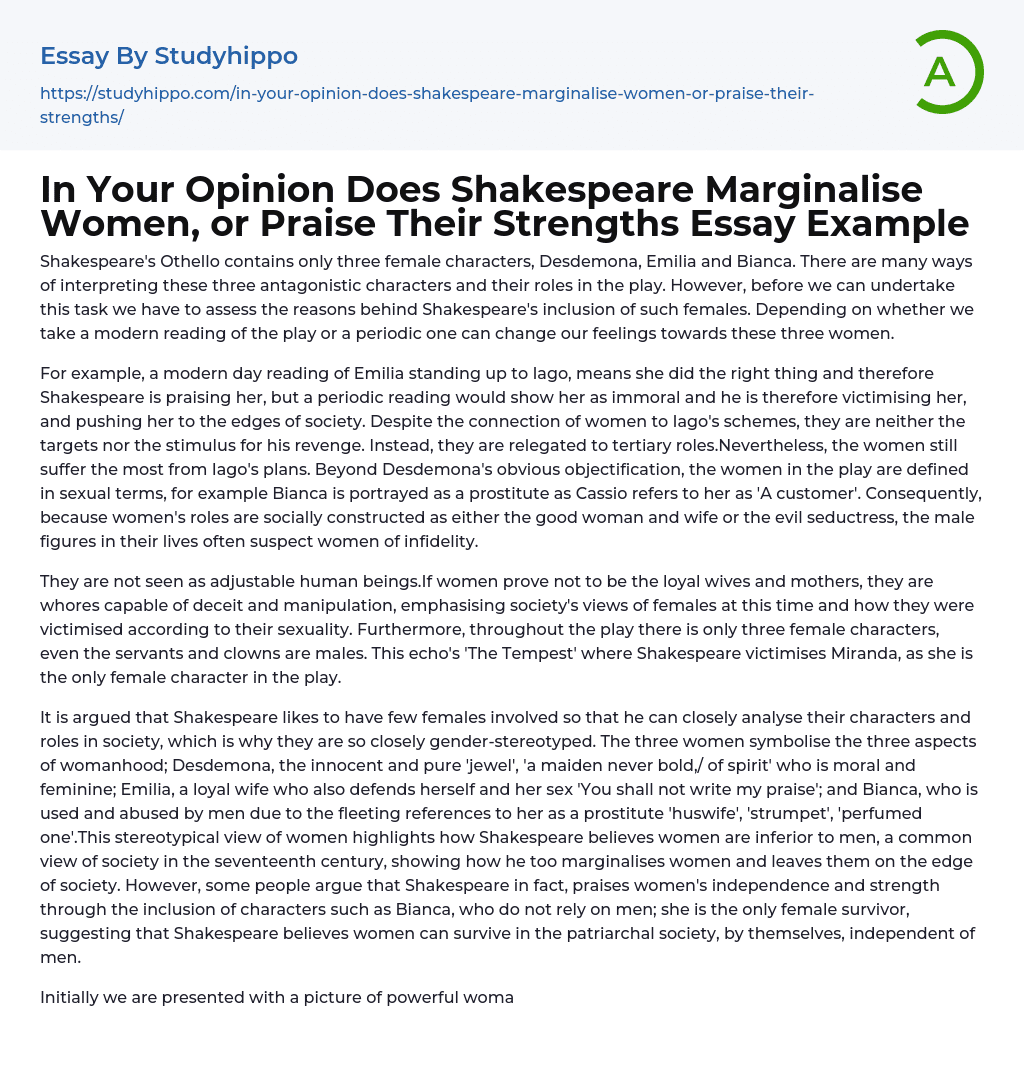

In Your Opinion Does Shakespeare Marginalise Women, or Praise Their Strengths Essay Example
Within Shakespeare's Othello, there are only three female characters: Desdemona, Emilia, and Bianca. Interpreting their roles and relationships can vary greatly, but it is important to first consider the reasons Shakespeare chose to include them. Depending on whether we interpret the play through a modern or historical lens, our perception of these female characters may differ.
Shakespeare's portrayal of women in Othello can be interpreted differently depending on the lens through which one reads the play. From a modern perspective, Emilia's resistance against Iago is commendable, while a periodic reading may depict her as immoral and victimized. Despite women's involvement in Iago's schemes, they are not the primary targets or instigators of his revenge, but rather are assigned subordinate positions. Nonetheless, women suffer the most from Iago's plans. Alongside Desdemona's objectification, other female characters like Bianca
...are presented in sexual contexts, further perpetuating society's binary construction of women as either pure or seductive. This often leads male characters to suspect women of infidelity.
The play depicts a society that does not view women as adaptable individuals. Society sees women as either loyal wives and mothers or deceitful and manipulative whores, based on their sexuality. This highlights the victimization of females during that time period. Additionally, the play only includes three female characters, with even the servants and clowns being male. This is similar to Shakespeare's 'The Tempest,' where Miranda is victimized as the only female character in the play.
Shakespeare's gender-stereotyped portrayals of women are argued to be a result of his desire to deeply examine their characters and societal roles. The three main female characters in his works represent different aspects of womanhood; Desdemona is a pur
and innocent maiden, Emilia is a loyal wife who also defends herself and her gender, and Bianca is a woman who is used and exploited by men. These archetypes further reinforce the societal belief that women are inferior to men that prevailed in the seventeenth century, highlighting Shakespeare's own marginalization of women. However, some argue that Shakespeare is actually celebrating women's independence and strength through characters such as Bianca, who survives without relying on men. Despite the stereotyping, Shakespeare recognizes that women possess unique qualities and strengths and can survive in a patriarchal society independently.
At first, Desdemona's character portrays a strong representation of femininity as she rebels against her father's wishes and establishes her autonomy by selecting her own spouse. She addresses her father as "my noble father" and affirms her devotion to him by stating, "You are Lord of all my duty."
Despite the weight of her responsibilities and the public scrutiny she faces, the protagonist highlights her strength in being able to defend herself. In addition, an analysis may suggest that Iago's hatred towards Desdemona is rooted in his complex emotions of fear and disgust. It can be argued that part of his disdain towards Othello stems from his fear of losing power to Desdemona, a female who has displaced him.
It is evident that Iago harbors a disdain for Desdemona's position of power, labeling her the general's "general," thus reinforcing Shakespeare's belief that women possess strength and independence. While some may argue that Emilia's assertion that men are merely "all but stomachs" highlights society's oppression of women, others believe it showcases her wisdom and realistic approach to marriage. This portrayal of
female independence and strength in speaking for themselves is further emphasized by her ability to see through lies. However, Desdemona's possession of power ultimately leads to her downfall, as Othello falsely accuses her of infidelity. This highlights Shakespeare's belief that women cannot wield power in the same way men can, as evidenced by Iago's manipulation of Othello. Interestingly, Shakespeare also presents women as moral and civil, evident in their refusal to use racially or derogatory terminology. Conversely, Emilia's speech suggesting she would commit adultery to elevate her husband to a position of power portrays her as immoral.Viewed from this perspective, one can contend that Shakespeare is acknowledging the power of women, as she is motivated by the betterment of her husband rather than seeking personal gain.
After analyzing the evidence, it is evident that Shakespeare's perspective on women can be interpreted in various ways. Although he portrays women as victims by minimizing their presence in the play and using their masculine qualities as a weakness, such as Desdemona's power, Shakespeare acknowledges their autonomy and strength by illustrating them as wise and moral. In contrast, men are portrayed as immoral and bestial. Despite living in a highly patriarchal society, Shakespeare shows support for women in Othello and depicts them favorably.
- Othello Jealousy essays
- A Doll's House essays
- A Midsummer Night's Dream essays
- A raisin in the sun essays
- A Streetcar Named Desire essays
- An Inspector Calls essays
- Death of a salesman essays
- Everyman essays
- Fences essays
- Hamlet essays
- Hedda Gabler essays
- Iago essays
- King Lear essays
- Macbeth essays
- Much ado about nothing essays
- Oedipus Rex essays
- Oedipus The King essays
- Othello essays
- Pygmalion essays
- Romeo And Juliet essays
- Tartuffe essays
- The glass menagerie essays
- The Importance of Being Earnest essays
- The Merchant Of Venice essays
- The Taming of The Shrew essays
- Twelfth Night essays
- Waiting For Godot essays
- Attitude essays
- Goals essays
- Personal Goals essays
- Personal Life essays
- Personality essays
- Principles essays
- Reputation essays
- Self Awareness essays
- Self Esteem essays
- Self Reflection essays
- Self Reliance essays
- Strengths essays
- Value essays
- Values essays
- Weakness essays
- Who Am I essays
- Aldous Huxley essays
- Alice Walker essays
- Amy tan essays
- Anne Bradstreet essays
- Anton Chekhov essays
- Arthur Miller essays
- Augustine essays



